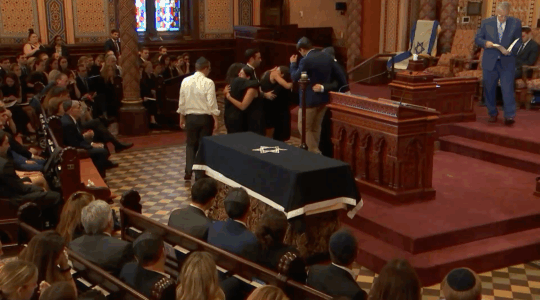.jpg)
In December 1941, some 791 passengers crammed aboard the SS Struma, having paid for safe haven from Nazi-controlled Roumania.
On February 24, 1942, having been denied entry by Turkish and British officials, all but ten were killed by a torpedo in the largest loss of life in the wartime immigration into Palestine.
[[READMORE]]
JTA first published an account of the ordeal on Feb. 12, 1942, revealing that the ship — built to accommodate 120 passengers — was in danger of capsizing at one point:
The sanitary conditions on the freighter are reported to be frightful in view of the overcrowding of the vessel. Of the 769 refugees on board, only twenty were allowed on deck at one time for for fresh air, since the captain feared that the freighter might capsize. In the middle of the voyage, when the freighter was in the stormy waters of the Black Sea, the engines and the radio were damaged by a storm and water began to pour into the vessel. The refugees fighting for their lives had to man the pumps constantly until the captain succeeded in bringing the freighter into a Turkish port.
Having survived the physical dangers of sea travel, neither Turkish authorities in Istanbul nor the British in Palestine were willing to take the refugees.
According to a database on Jewish posted on genealogical website jewishgen.org, 9 passengers were allowed to disembark, at least some of whom provided eyewitness accounts of the scope of anti-Jewish activity in Roumania to a JTA correspondent in Istanbul:
Several pogroms occurred in Jassy but the most terrible of them was carried out five weeks ago when 8,000 Jewish men and women were slaughtered by Rumanian soldiers in house-to-house plundering and killing. After the pogrom hundreds of Jews were herded into cattle trains, without food and water, for transportation to Transnistria. The majority of them, however, died from hunger and cold before reaching their destination. They were buried in a collective grave in the township of Tirgu-Frumas.
On Feb. 23, the SS Struma — anchored for upwards of 30 days and without power — was escorted from Istanbul and left adrift in the Black Sea.
The next day, the ship exploded, killing all but one passenger aboard.
Initially reported to have hit a stray mine, it wasn’t until April 16 that JTA published a report that a Russian vessel had torpedoed the Struma:
TEL AVIV, Apr. 15 (JTA) – The refugee steamer Struma which sank in the Black Sea on February 24, carrying 768 Jewish men and women fleeing from Rumania and Bulgaria to their death, was torpedoed by an unidentified submarine, according to an eye-witness account brought here today by Mrs. Nadia Solomowitz, who was taken off the ship shortly before it left Istanbul because she was expecting a child. Mrs. Solomowitz, whose husband perished on the Struma and whose new-born child died in an Isvanbul hospital, related that in the concentration camp to which she was sent after leaving the hospital she met twenty-one year old David Stolira, the only survivor of the catastrophe. Stolira, who is an expert swimmer, told Mrs. Solomowitz that the Struma was torpedoed by an unidentified underseas craft and that he and three other refugees clung to a piece of floating wreckage. After several hours, however, his companions wore frozen to death but he succeeded in keeping alive by swimming around.
The Struma was the subject of the 2002 documentary "The Struma," which included an interview with the lone survivor aboard the ship, David Stoliar.
Earlier this year, marking the 70th anniversary of the ship’s demise, Stoliar gave an interview to Ha’aretz.
Below is a video of a memorial in Bucharest, Romania earlier this year, which was attended by Israeli officials.
JTA has documented Jewish history in real-time for over a century. Keep our journalism strong by joining us in supporting independent, award-winning reporting.





